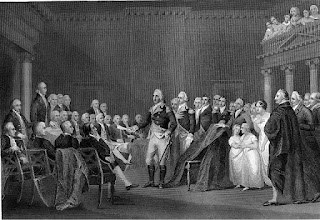George Washington's Resignation: The Pinnacle of American Virtue
On December 23, 1783, a profound silence enveloped the Maryland State House as George Washington, the victorious commander-in-chief of the Continental Army, prepared to resign his commission. This act was not merely a formal procedure but a defining moment of American character and democracy that continues to echo throughout history.
In the aftermath of the Revolutionary War, the newly formed United States of America was a nation teetering on the brink of potential chaos. It was a time when victorious generals in history would often seize power or assert control. Yet, Washington, with a firm understanding of the delicate experiment in democracy that he had fought for, chose a different path.
Dressed in his military uniform, Washington addressed the Congress with a speech that was both a farewell and a testament to his unwavering dedication to American republicanism. His words were not merely rhetoric; they embodied American ideals. Washington's resignation set a precedent that power should not be a prize won through war but a responsibility bestowed and relinquished according to the laws of the land and the people's will.
This act was a vibrant declaration of the American commitment to civil authority over military power. After leading the nation to victory, Washington's voluntary return to private life affirmed his belief that liberty and governance should permanently reside with the people, not rulers or military leaders. It was a striking contrast to the norms of the time, reflecting a deep patriotism rooted not in personal glory but in a genuine desire for a free and democratic society.
Washington's resignation bolstered the fragile American democracy, reassuring both American citizens and the watching world that the new nation would stand firm on its foundational principles. His action was a beacon of hope and a symbol of the American commitment to democratic governance and the peaceful transition of power. It was a message that in America, leaders are servants of the people, not their rulers.
Moreover, the impact of Washington's resignation resonated beyond the immediate moment. It influenced the shaping of the American Presidency, setting a standard of humility, integrity, and respect for democratic institutions. Future presidents and leaders would reflect on this event as a cornerstone of American political philosophy, a guiding light for conduct and decision-making.
In the grand tapestry of American history, George Washington's resignation stands out as a bold stroke of integrity and patriotism. It was an action that secured his legacy as a true American Cincinnatus and laid the foundational ethos for the nation's enduring commitment to democracy, liberty, and the peaceful transfer of power. Reflecting on this momentous event is a perennial reminder of the values and principles that define and distinguish the United States of America.



Comments
Post a Comment